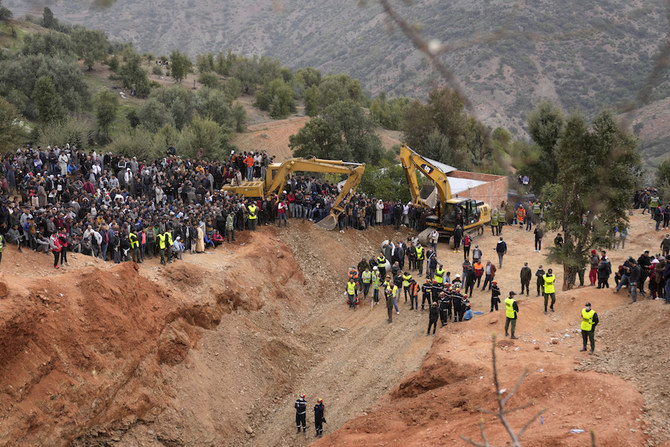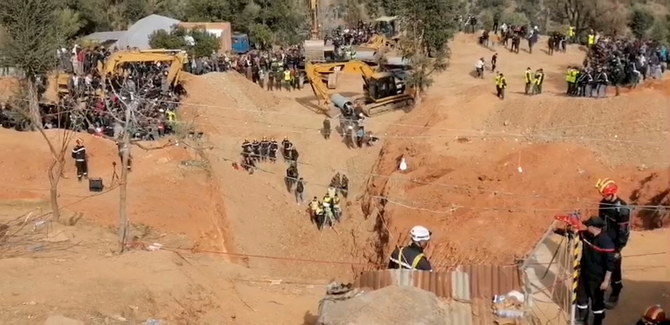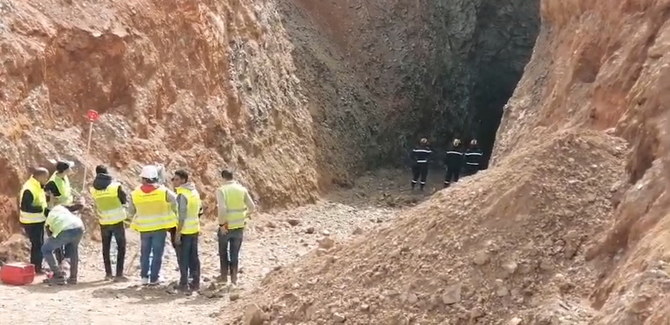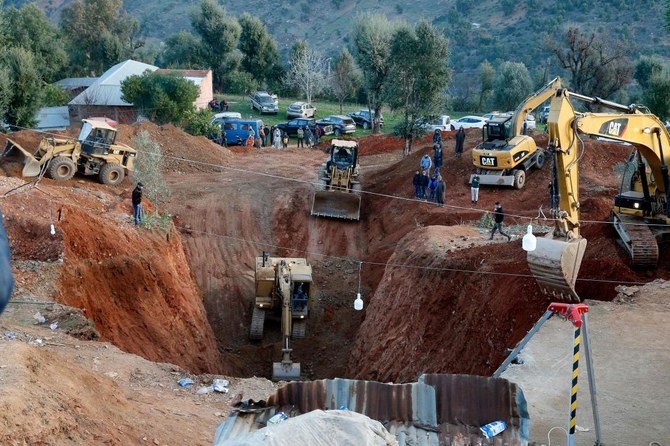DUBAI: Moroccan rescuers were only meters away Saturday in their nerve-wracking but increasingly urgent effort to rescue Rayan, a five-year-old boy trapped underground whom they hope to find alive.
For five days the complex and risky earth-moving operation has gripped residents of the North African kingdom and even sparked sympathy in neighboring Algeria, a regional rival.
Abdelhadi Tamrani, an official in charge of the operation, said he had “big hopes” of pulling the boy out alive from the well.
But the more time that passes, the more fears arise over his condition.
Rayan accidentally fell about 32 meters (35 yards) down the tight, empty shaft near his home in the remote village of Ighrane in Chefchaouen province on Tuesday afternoon.
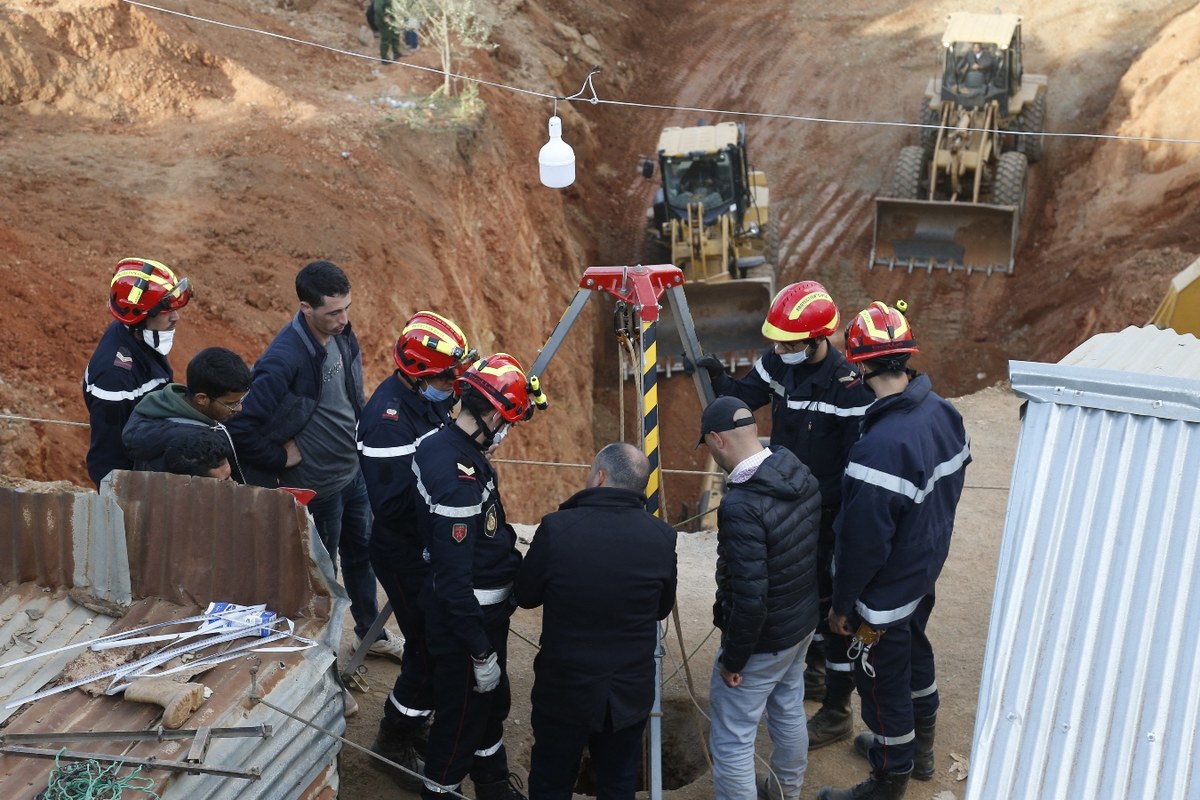
Moroccan authorities and Moroccan civil defense members work to rescue five-year-old child Rayan trapped in a deep well for over two days in the northern province of Chefchaouen near Bab Berred on February 3, 2022. (File/AFP)
Rescue crews, using bulldozers and front-end loaders, excavated the surrounding red earth down to the level where the boy is trapped and are now digging horizontally toward him.
They face a risk of landslides, and on Saturday they had to maneuver around a large rock.
In darkness, crews moved a heavy pipe into position in the area. One rescuer lugged what appeared to be a jackhammer.
“We’re almost there,” said one of the operation’s leaders, Abdesalam Makoudi, adding “tiredness is kicking in, but the whole rescue team is hanging on.”

Little Rayan fell down the well on Tuesday evening. (Twitter user)
According to Al Arabiya news channel the only way to reach the boy is by digging a hole and pulling him from the opposite side of the well through which he fell.
Abdel Hadi Tamrani, head of Civil Protection on site, told Arab News that due to the crumbling of the earth around the shaft, teams are forced to take a break from time to time.
“The more we dig the greater the risk of crumbling, so to ensure the safety of the excavator operators, we have to take breaks at times,” he said.
“It is a very sensitive operation, we are in the process of securing the lower part of the cavity before sending a special team which will aim to dig a hole about 4 meters horizontally, to reach the location where Rayan is.
“The main challenge we have now is not to put the lives of our teams at risk.”
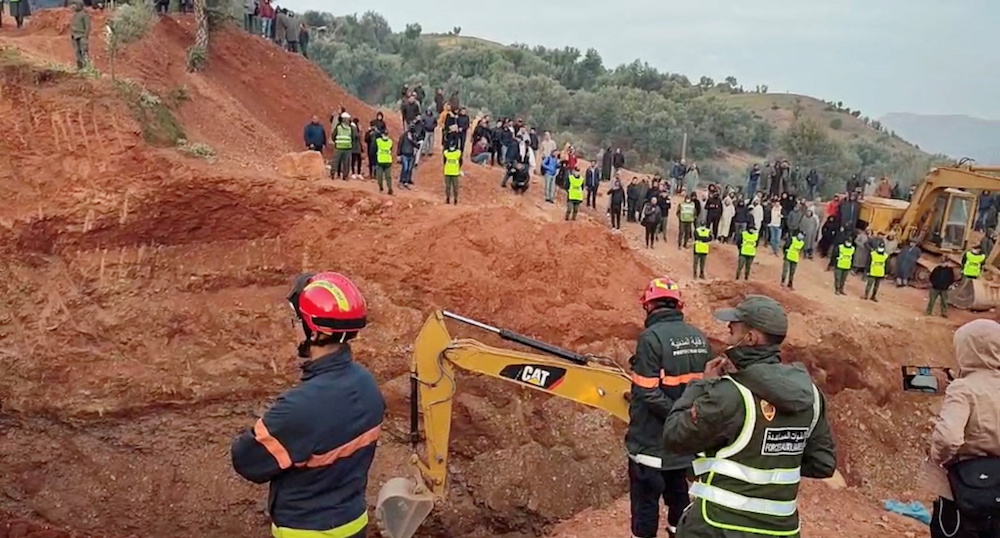
Teams using machinery to excavate the ground in order to free the boy. (Reuters via Al3omk.com)
When asked about his condition, Tamrani said Rayan was not eatring or drinking and might have fallen into a coma, but “still had hope he is alive,” adding that a Royal Armed Forces helicopter was available to transport the child as quickly as possible to the nearest medical unit.
Recalling the events of Tuesday evening, Rayan’s mother told local media she had looked for him everywhere after his disappearance.
“When I did not find him, I understood that he had fallen into the well located near the house,” she said.
الطفل المغربي ريان يظهر في تسجيل جديد وهو يفتح عينيه ويتحرك من مكانه وجهود مكثفة متواصلة لإنقاذه بعد أن علق ببئر منذ أكثر من 60 ساعة
يارب ببركة هذا اليوم الفضيل رده إلى أهله سالمًا معافى#أنقذوا_ريان pic.twitter.com/TRPG3YD5Bh— خالد صافي #فلسطين (@KhaledSafi) February 4, 2022
The young child's father told Al-Arabiya that the last time he saw Rayan through surveillance cameras was Thursday afternoon.
People have taken to social media platforms expressing their support.
Moroccan footballer and PSG star Achraf Hakimi posted his support, alongside emojis of a broken heart and hands together in prayer.
“I want everyone to pray for this little five-year-old boy who fell into a very deep well and is still fighting to stay alive for 48 hours. Our heart is with him,” a twitter user said.
Another twitter user said: “Don’t worry Rayan. Angels is with you and Allah with you and all the world is with you. We love you we waiting to see you.”
Don’t worry rayan. Angels is with you and Allah with you and all the world is with you
We love you we waiting to see you#Rayan #SaveRayan #قلوبنا_مع_ريان #ريان #انقذوا_ريان #الطفل_ريان— AMNA (@amnakamuorr) February 4, 2022
Rescue worker Imad Fahmi told local media that he was able to go down 25 meters into the well but could not continue.
“As for little Ryan, I tried to talk to him to get his reaction, but I only heard his breathing and his cries of distress, as if he was suffering from an injury. He was 10-12 meters from me, but the space was very tight. I tried to dig with my feet to reach it, but to no avail. At one point I couldn’t go any further,” he added.
Our heart and thoughts goes to Chefchaouen, Morocco, 5-year-old Rayan fell into a 60-meter deep water has been stuck for over 30 hours. he still alive and they're trying to save him. Hopefully you will getting back very soon.#قلوبنا_مع_ريان#أنقذوا_ريان pic.twitter.com/2DI5uOCqDT
— Majd khalaf (@majdkhalaf1993) February 3, 2022
Lead rescuer Abdelhabi Temrani told Al Oula television that the diameter of the well was less than 45 centimeters.
Baitas said the nature of the soil meant it was too dangerous to try to widen the hole, meaning major excavations around it were the only solution.



